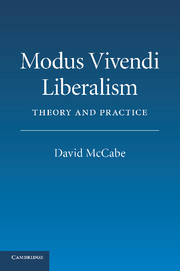Book contents
- Frontmatter
- Contents
- Acknowledgments
- PART I STARTING ASSUMPTIONS
- PART II THE FAILURE OF THE MAIN ARGUMENTS
- PART III MODUS VIVENDI LIBERALISM
- 7 The case for modus vivendi liberalism
- 8 The challenge of gender equality
- 9 Compulsory education in the MVL state
- 10 The limits of modus vivendi liberalism
- Bibliography
- Index
10 - The limits of modus vivendi liberalism
Published online by Cambridge University Press: 06 July 2010
- Frontmatter
- Contents
- Acknowledgments
- PART I STARTING ASSUMPTIONS
- PART II THE FAILURE OF THE MAIN ARGUMENTS
- PART III MODUS VIVENDI LIBERALISM
- 7 The case for modus vivendi liberalism
- 8 The challenge of gender equality
- 9 Compulsory education in the MVL state
- 10 The limits of modus vivendi liberalism
- Bibliography
- Index
Summary
It must be acknowledged that the modus vivendi liberalism I have outlined is not entirely satisfying. In two main areas it seems especially inadequate. The first concerns the worry that MVL fails to provide precisely what we want from a political theory – viz., a rationally vindicated solution to the problem of moral conflict that all parties within a political community would wholeheartedly accept. MVL does not resolve the moral dissensus that is the context for liberal theory through a more complete and reflective account, it might be said, but instead acquiesces to such conflict and shows us only how to manage it. In thus failing to articulate a rational harmony among the competing parties of liberal society, it fails to reconcile us to our social world in the manner of philosophical reflection at its best.
In The Law of Peoples, John Rawls gives elegant expression to this general worry. The book begins and ends with Rawls's discussion of a realistic utopia, by which he means a vision of the sort of collective moral improvement genuinely possible given the realities of the human condition. In the context of that discussion, Rawls says this:
Eventually we want to ask whether reasonable pluralism within or between peoples is a historical condition to which we should be reconciled. Though we can imagine what we sometimes think would be a happier world – one in which everyone, or all peoples, have the same faith that we do – that is not the question, excluded as it is by the nature and culture of free institutions.[…]
- Type
- Chapter
- Information
- Modus Vivendi LiberalismTheory and Practice, pp. 238 - 243Publisher: Cambridge University PressPrint publication year: 2010
- 1
- Cited by

